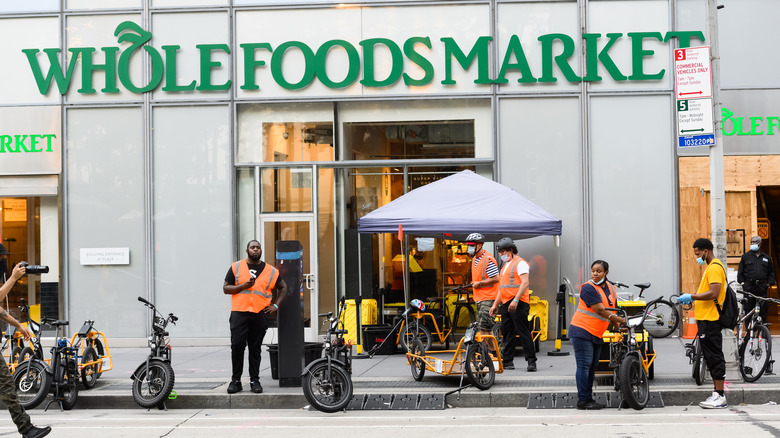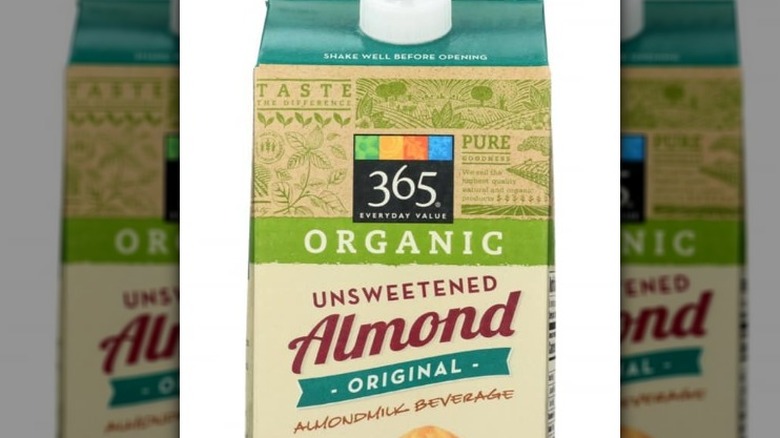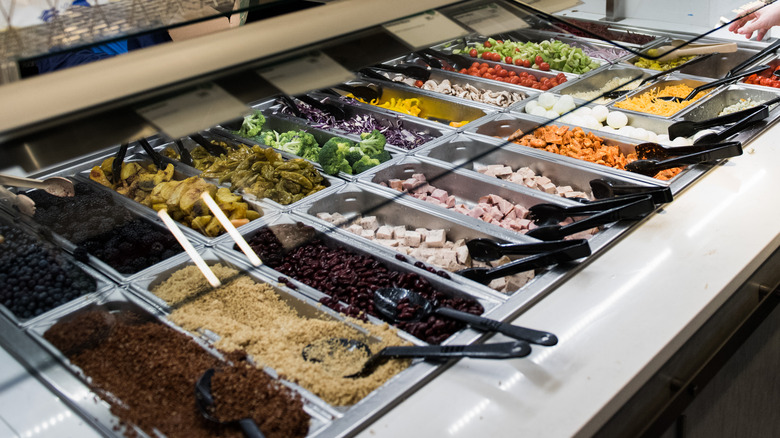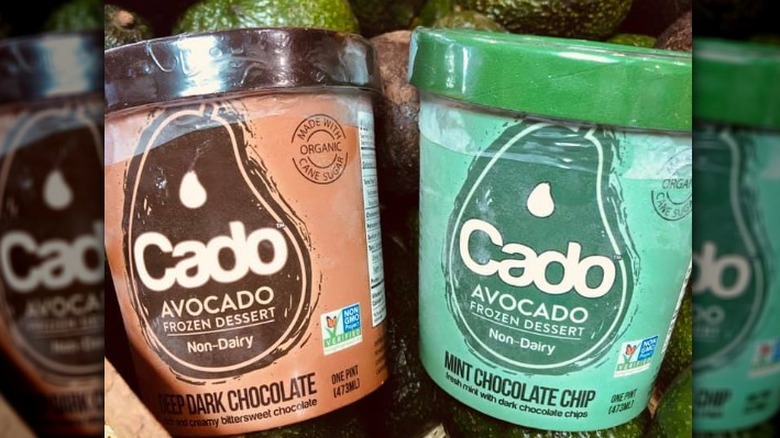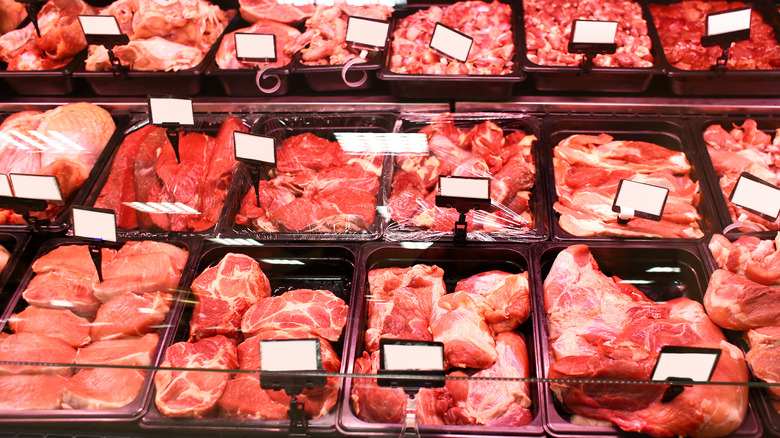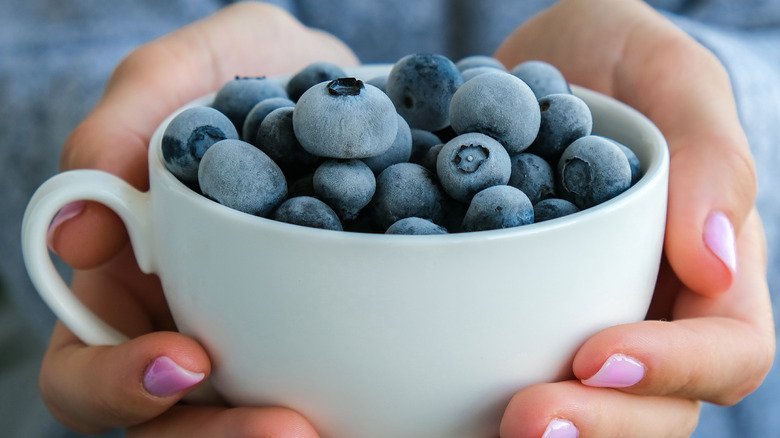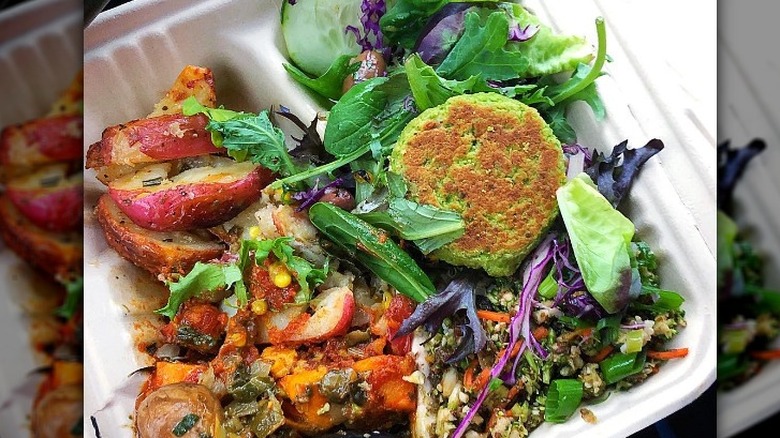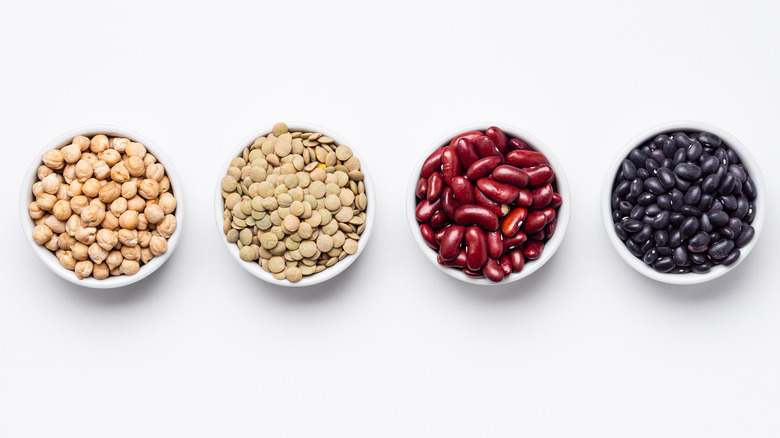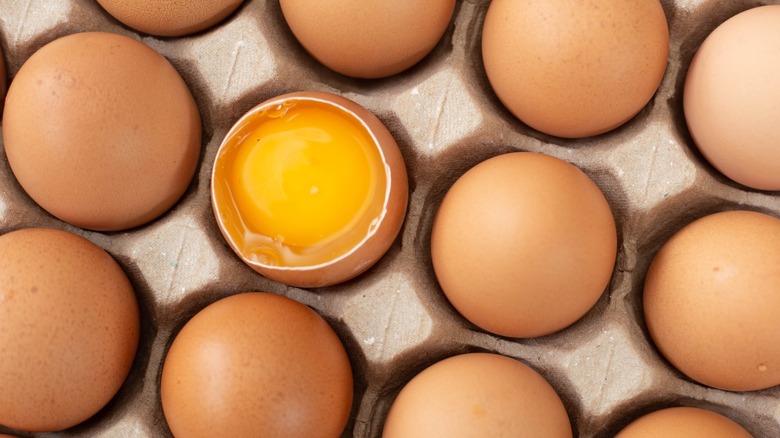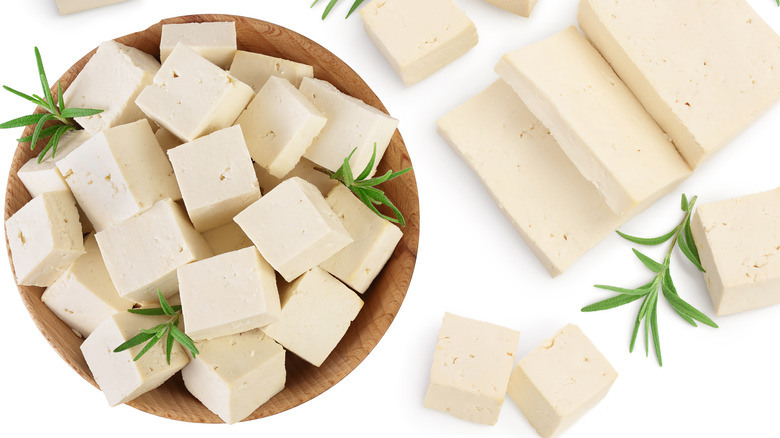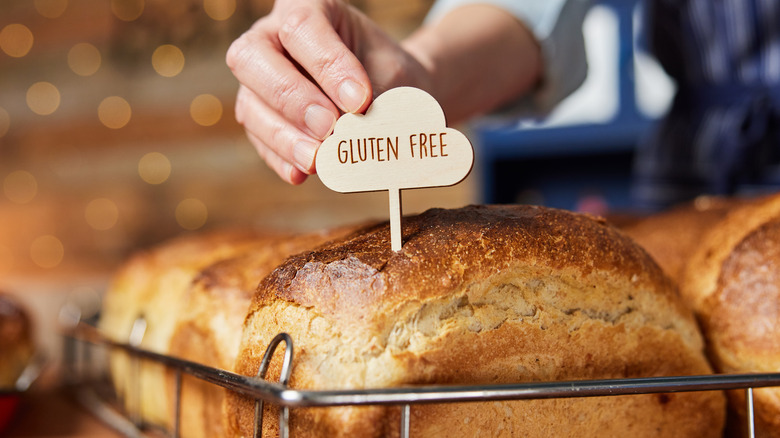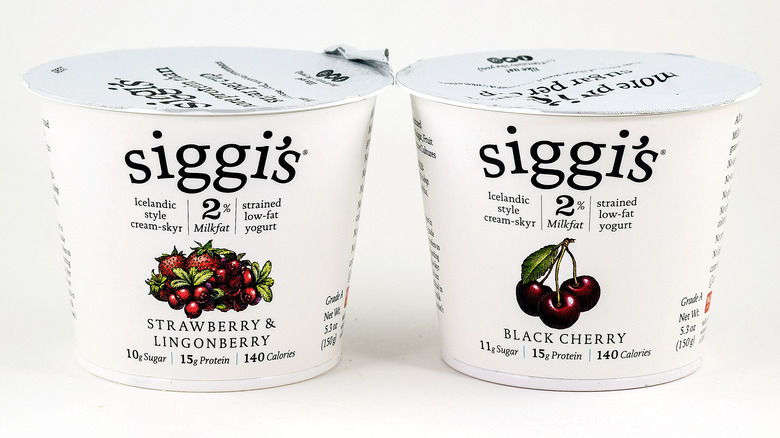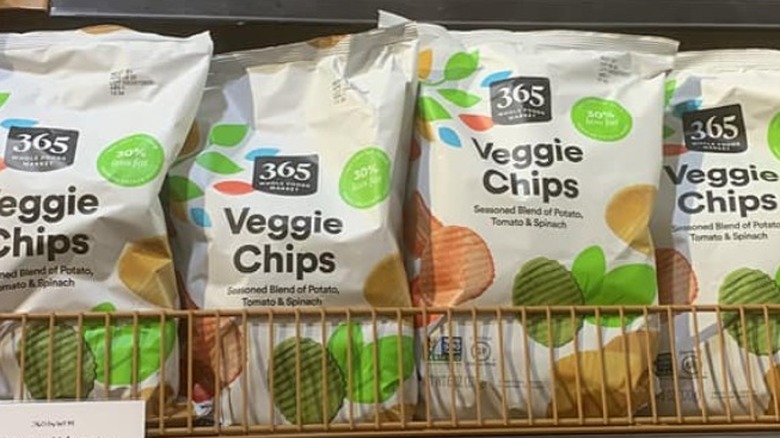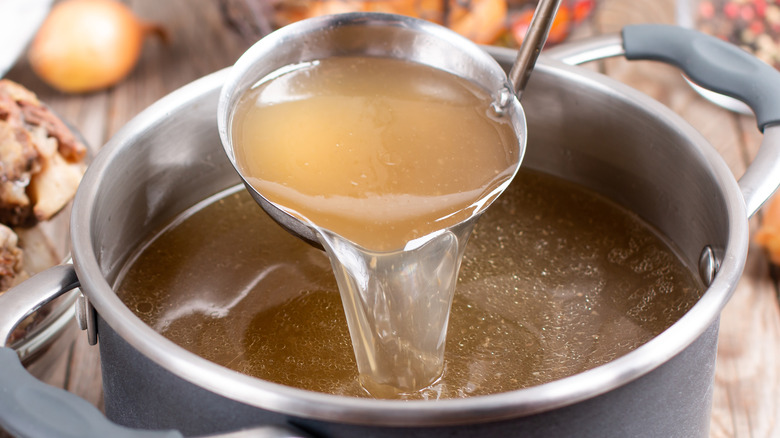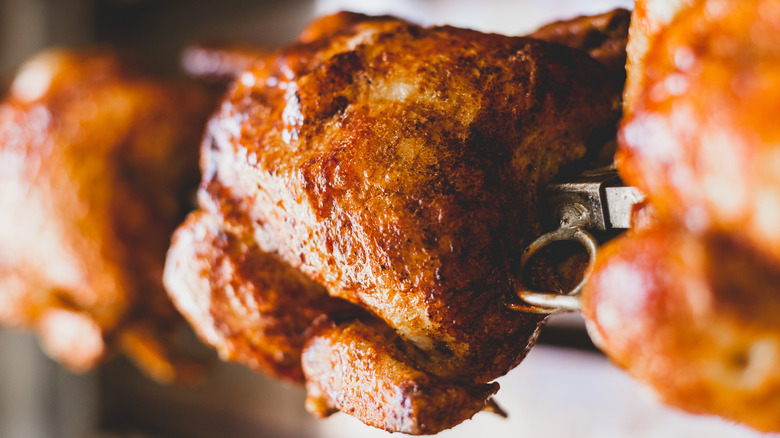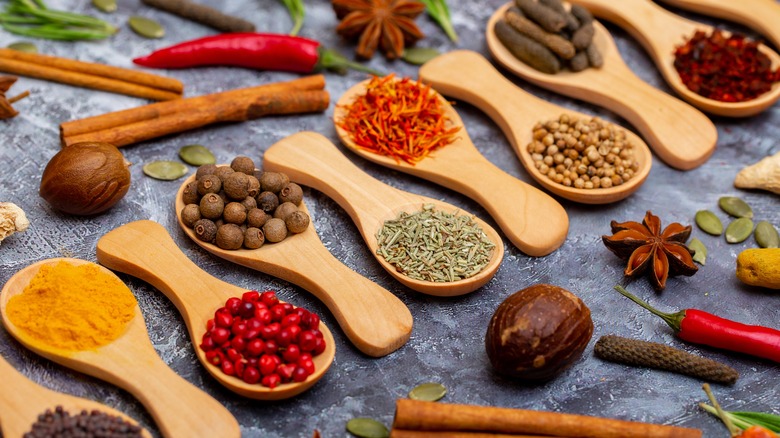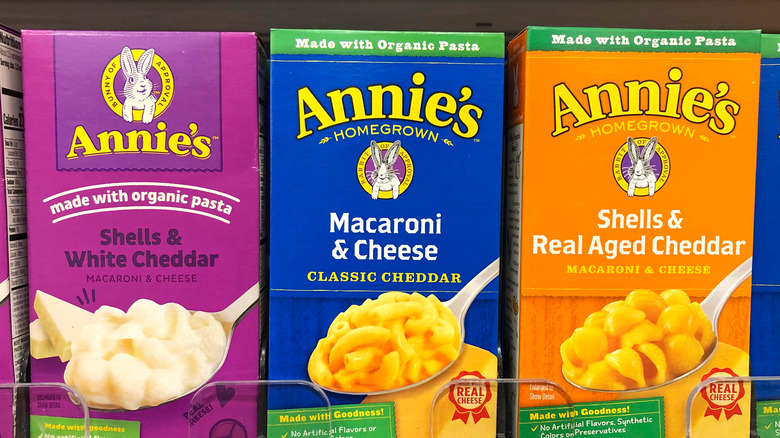16 Things You Should And Shouldn't Buy At Whole Foods
We may receive a commission on purchases made from links.
Boasting a bevy of organic bounty, Whole Foods Market bills itself as a "source for good" (via Whole Foods), a warm-and-fuzzy claim to environmental stewardship and sustainability. However, while there's no doubt you can get a brilliant array of delicious, good-for-you-items at Whole Foods, there are some significant pitfalls, too. For starters, it's easy to sink your "whole paycheck" into Whole Foods' coffers, paying top buck for pantry staples and foods you can easily get elsewhere.
Whole Foods' posh and progressive ethos was also rocked by an overpricing scandal (via Business Insider) less than a decade ago, leading shoppers to justifiably question how above-board the chain really was. If you've been a Whole Foods skeptic since the scandal or are unwilling to drain your bank account for no good reason, you've come to the right spot. So let's separate fact from fiction with a no-holds-barred look at what's really a goldmine at Whole Foods and what's just overpriced, prettily-packaged hype.
Buy: Almond milk
Whole Foods' 365 Almond Milk is a solidly budget-friendly and delicious buy, competitively priced compared to bigger box stores (like Target) with a creamy, luxe consistency and a hint of sweetness. 365 Almond Milk wins on two fronts: its on-point price, and the fact that it manages to taste mildly honeyed and nuanced without overpowering you with artificial flavoring.
Some other almond or coconut milks are saccharine bombs, more like liquid desserts than milk substitutes. But 365 Almond Milk doesn't need antics or overcompensation. Instead of a sugar high, you'll get a muted velvety texture perfect for your morning cup of joe or as the silken base for chia seed pudding. 365 Almond Milk is endlessly versatile, working its magic in savory and sugary dishes. Although almond milk lasts about a week in the fridge (via Does It Go Bad?), you may find yourself powering through quart after quart of this liquid gold. Better buy two to be on the safe side.
Don't buy: Salad bar items
Although it might look tempting with its jewel-toned rows of fresh veggies and mouthwatering prepared goodies, you should never buy from the salad bar at Whole Foods. According to Spoon University, Whole Foods prices its make-your-own salads at a whopping $8.99 per pound, living up to its not-so-flattering moniker "whole paycheck" (via Urban Dictionary). The oblivious and super-starving are easy prey for Whole Foods' salad bar, but savvy shoppers know to steer clear. Instead, pick up some basics and throw together a healthy meal on your own. Your bank balance will thank you.
If you must indulge in Whole Food's cash-sapping honeypot, do so wisely. As Budget Bytes points out, loading up on light greens and more buoyant — and thereby less costly — fare can save you big bucks at checkout. Since adding salad dressing is one sure-fire way to bulk up your order and thin out your wallet, add it at home.
Buy: Avocado dairy-free ice cream
According to Live Kindly, Cado Avocado Frozen Dessert is available everywhere at Whole Foods stores. The fruit-based ice cream imposter tastes like the real deal, using satiny pureed avocado and organic sugar as its base. Plus, it's got comparably less sugar than other favorite ice cream brands (via Delish). So Cado Avocado Frozen Dessert is a massive win for vegans and people who want to limit their lactose, coming in cute little pints perfect for sharing... or indulging in all on your own; who are we to judge?
According to its website, Whole Foods carries all seven Cado Avocado Frozen Dessert flavors, so you can stock up and stash them away for those days when your sweet tooth is raging. Whole Foods is a convenient place to get your oh-so-sweet avocado fix in a vast selection, at competitive prices, too. Once you try one, you'll probably want to get your hands on them all, so head to Whole Foods for the lot.
Don't buy: Certain meats
You'll pay top dollar for meats at Whole Foods, with protein staples like chicken breast costing well over twice as much more per pound (via Whole Foods) there than virtually anywhere else (via Statista). Red meat also comes with a sky-high premium, with rib-eye steak clocking in at roughly $20 a pound at Whole Foods and far less at other supermarkets (via Eat Like No One Else), so what gives?
Whole Foods claims that it sells humanely-killed meat, an assertion vigorously challenged by PETA (via the Washington Post). Even if its claim of cruelty-free meat products were totally accurate, the prices are still out of sync with the market. Those looking to get sirloin or pork chops without a side of guilt have plenty of other options, like local farmer's markets (via Humaneitarian). The lesson here is to support the smaller farmers and get actual humanely-raised meat rather than pay top dollar for Whole Foods.
Buy: Frozen fruit
According to Salon, affordable frozen fruit is one place where Whole Foods shines. Its 365 line has pre-cut and flash frozen berries and fruits from all over the world, all conveniently packaged in freezer-proof bags. Tossing some frozen fruit into your morning smoothie or oatmeal is a quick 'n simple way to inject some extra nutrients into your diet. Plus, according to CNN, frozen fruit might even be better for you than the fresh stuff, since they don't have any time to lose valuable nutrients on the way from the vine to your table.
Whole Foods does right by frozen fruit, pricing it ultra-competitively. For example, blueberries cost less a Whole Foods than at Target, a shop lauded for its fair pricing and budget buys. Stock up on plenty of frozen gems next time you're at Whole Foods. They'll last a good long time and save you big bucks on fresh fruit.
Don't buy: Prepared foods
According to Organic Authority, Whole Foods got spanked for playing fast and loose with pre-packaged food prices back in 2018. While the upcharging and mislabeling might not be as egregious today, you should still avoid Whole Foods' pre-packaged food section whenever possible. As compared to a fellow high-end grocer, Wegmans, Whole Foods consistently comes up short for both single-serving foods and larger family-style fare in nearly every category.
For example, Wegmans' pre-packaged sushi is several dollars less than a similar product at Whole Foods. Prepared family-style salmon is also cheaper per pound at Wegmans than at Whole Foods. According to Digital Initiative, Wegmans swims in the same high-end pond as Whole Foods, but its pricing structure is deliberately and distinctively more pedestrian. For sheer budgetary reasons alone, stores like Wegmans make far more sense when you're scooping up pre-packaged, convenience items, and you won't sacrifice quality either.
Buy: Canned beans
It's Whole Foods for the win when it comes to premium canned beans. Not only does Whole Foods have a tremendous collection of everything from black beans to pintos, but it also consistently comes in cheaper than many other supermarkets. Compared to Target, Whole Foods has a bigger and more cost-effective selection, making it the ideal place to stock up for the impending zombie apocalypse or just when you want to make a killer chili.
Canned beans can last for up to five years, too (via Food Network Healthy Eats), so there's no reason not to load your cart up with every type imaginable next time you find yourself at Whole Foods. As The Sun points out, canned foods are savvy shoppers' go-to because they're pretty darn ubiquitous. Use them to bulk up your next hearty stew or smashed up into a velvety and nutrient-heavy bean dip.
Don't buy: Eggs
Skip Whole Foods for go-to breakfast faves like eggs, unless you want to shell out top dollar for a humble 12-pack. Whole Foods' eggs cost is best described as confounding, with the New York Times noting that its "whole paycheck" nickname is still well-deserved in the pantry staple department. Although Whole Foods' eggs are organic, it doesn't justify the price tag, which tops $10 in many cases (via Whole Foods).
If you're yearning for some organic yolks, try Target instead, where the prices are nearly half as expensive. Whole Food's egg prices might leave you wondering if they came from a golden goose, but sadly, it just appears to be a considerable markup instead. So unless you're looking for specialty or pasteurized eggs, save your Whole Foods budget for more cost-effective and arguably better fare, and leave those sky-high-priced eggs to chill in the cooler instead.
Buy: Tofu
According to Vegan Calm, tofu is one of Whole Foods' best budget buys, with a great selection and super-competitive pricing. It's also an excellent spot to dip your toe into tofu tasting, since you can get smaller chunks to spice up your next stir fry. The versatility and lack of commitment make Whole Foods an excellent option, because tofu non-devotees don't have to wrestle with wasting a huge block. Buy as you need.
Whole Foods also boasts a big ol' selection of tofu, from seasoned to silken. Since regular tofu can be a little bland, lemon pepper or teriyaki tofu are smart meatless Monday swaps that won't eat up your time or budget. According to Masterclass, you can refrigerate and freeze tofu successfully with a smidge of prep-work, so don't be afraid to pick up tofu in bulk and set it aside for a busy weeknight when the take-out cravings kick in.
Don't buy: Gluten-free items
According to PR Newswire, America's appetite for gluten-free fare continues to rise, meaning that there's more competition out there than ever before for big-box supermarkets to jockey for their position in the marketplace. Unfortunately, Whole Foods is not rising to the wheat-free challenge. Although Whole Foods has comparable prices on gluten-free freezer staples as opposed to other major stores like Target, it really falls flat in the pantry staple department.
For example, Whole Foods' quinoa holds a much heftier price tag than Trader Joe's product, begging the question of why this pearly product from the Andes (via The Guardian) is so highly prized at Whole Foods. Unfortunately, it doesn't seem like Whole Foods' quinoa is all that much better, but that higher pricing on certain goods is just par for the gluten-free course (via the Wall Street Journal). Lucky for consumers, there is no shortage of other, more cost-effective options.
Buy: Yogurt
According to Business Insider, Whole Foods has exceptionally competitive prices when it comes to high-end yogurt brands like Siggi's and Chobani, making it a great place to stock up on those basics. In addition to Siggi's swoon-worthy and scrumptious combos of unique flavors, the texture and quality are on point, too. Plus, according to Levels Health, Whole Foods' non-dairy alternatives are also great for stand-alone eating or when stirred into savory sauces and sides.
Whole Foods also has an excellent selection of dairy and non-dairy yogurts, including local fare. You'll find economy-sized tubs of Chobani, perfect for portioning out yourself, or artisanal blends with fruit on the bottom. There's also drinkable yogurt and Whole Foods' signature 365 blends, an organic offering for less than a dollar. Whole Foods might not do all dairy right, but their yogurt selection and pricing are on the level. So pick up some breakfasty pints next time you visit.
Don't Buy: Veggie chips
Don't let the name deceive you! 365 Veggie Chips are not a healthy alternative to potato chips. In fact, according to NBC Miami, these chips are jam-packed with tons of calories and fat, making them the nutritional equivalent of potato chips. NBC Miami also points out that veggie chips tend to be loaded with sodium, even more so than potato chips. So while those rust-colored and green hues might be reminiscent of a healthy vegetable snack, the real thing is a lot less diet-friendly.
Generally speaking, veggie chips are also costlier than regular old potato chips (via NBC Miami), so when it all comes down to it, you're far better off investing in a bag of Lay's. Leave the 365 Veggie Chips on the shelf and head to Whole Foods' actual produce department for some fresh stuff that you can serve with a hearty homemade dip.
Buy: Bone broth
Bone broth is one of Whole Foods' best buys. They have a giant selection of reasonably-priced broths (via Whole Foods), and you can incorporate this trendy and powerful health food into virtually any recipe. According to the BBC, there is a myriad of benefits associated with bone broth, including a well-functioning immune system, healthier joints, and even smoother skin. In addition, bone broth has collagen, one of the key ingredients for dewy, youthful-looking skin. Finally, the BBC notes that bone broth might even help you get your beauty sleep, too.
According to Kettle and Fire, finding the ideal boxed bone broth comes down to a few essential qualifications, like whether or not the broth has additional preservatives and what type of bones went into it. Fortunately, with Whole Foods' considerable selection, you can find something on par with your needs without having to spend hours concocting bone broth at home.
Don't Buy: Rotisserie chicken
At over $12, Whole Foods' rotisserie chickens are much more expensive than those from other supermarkets like Costco, BJs, Sam's Club, and Publix (via CNN). Compared to Costco's similar rotisserie chicken, Whole Foods' version tends to be pretty underwhelming, but you can at least pat yourself on the back for buying a cruelty-free bird — or can you?
According to ProPublica, Whole Foods' rotisserie chicken might not be as humane as you think. They concluded that Whole Foods' organic bird came from a processing plant that handled non-organic, conventionally slaughtered factory-farmed meat. What's more, Whole Foods worked with several different facilities, many of which had a crossover with chicken giants like Perdue. Without the humane guarantee, Whole Foods' rotisserie chicken and chicken selection, in general, seems a lot more unattractive. Since you can get your rotisserie bird for about three times less at Costco, it makes sense to avoid Whole Foods for this one.
Buy: Bulk spices
Whole Foods' bulk bins are absolute gold, and you can save loads and loads of cash on dried items with long shelf lives, as well as rare spices. Plus, shopping in bulk is generally cheaper than buying packaged items, and you can control how much you get. Whole Foods' bulk spices are excellent and moderately priced, and there's a nice selection. According to Whole Foods, buying bulk does favors for your wallet, and is also environmentally friendly. It's a win-win for everyone, and a seriously smart way to spend your Whole Foods budget.
You can also pick up dried beans, lentils, fruit, rice, and oats in the bulk aisle. The only cash-sucking area to avoid are the bulk nuts, which you can get cheaper elsewhere in the store. So, avoid the markup on pre-packaged spices and get everything you need from the global grab-bag that is the Whole Foods' bulk aisle.
Don't Buy: Annie's Shells and White Cheddar Macaroni and Cheese
Whole Foods has a lot of great options for the kiddos, and you'd be forgiven for scooping up a few boxes of Annie's Shells & White Cheddar Macaroni and Cheese on your next visit, but beware. According to Whole Foods, boxes of this organic kid fuel cost over a dollar more than at Target. Depending on how many hungry mouths you have to feed, this massive increase could result in spending your whole paycheck on munchies.
Instead, save your Whole Foods budget for other items, like the bulk section, that are actually cost-effective. While we may never know why Annie's Shells & White Cheddar Macaroni and Cheese is so astronomically more expensive at Whole Foods, we can say that it's a bad idea to go down the organic boxed meal convenience food route — especially when other stores give you a significantly better deal.
